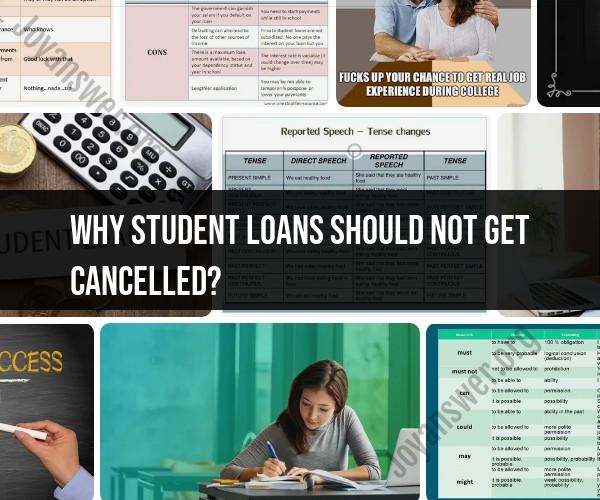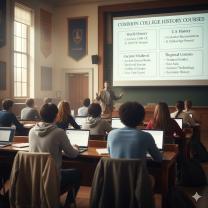Why student loans should not get cancelled?
The debate over canceling student loans in the United States is a complex and contentious issue, and there are several arguments against widespread student loan cancellation. It's important to note that opinions on this topic vary widely, and these arguments represent some of the perspectives against loan cancellation:
Moral Hazard: Critics argue that canceling student loans may create a moral hazard by incentivizing future borrowers to take on more debt, assuming it will be forgiven. This could potentially lead to increased college costs and higher loan amounts in the future.
Fairness: Some argue that loan cancellation may be unfair to those who have already paid off their student loans or never took out loans in the first place. They question why current borrowers should receive forgiveness when others have already fulfilled their obligations.
Cost: Critics point out that widespread student loan cancellation could come at a significant cost to taxpayers. Finding the necessary funds to cover such cancellations could lead to higher taxes or increased government borrowing, potentially burdening future generations.
Economic Impact: Some argue that canceling student loans may not have the intended economic stimulus effect. Critics contend that the benefits of loan forgiveness may not be distributed evenly and could disproportionately benefit higher-income individuals who hold larger loan balances.
Inefficiency: There are concerns that a one-size-fits-all approach to loan cancellation may not be the most efficient way to address the issue of student debt. Some suggest that targeted assistance to borrowers facing financial hardship or supporting policies to reduce the cost of education could be more effective.
Impact on Colleges: Critics also contend that widespread loan cancellation could reduce colleges' incentives to control costs, as they may not feel the pressure to lower tuition fees if students expect their loans to be forgiven.
Devaluing Higher Education: There are concerns that canceling student loans might send a message that higher education is not worth the investment, potentially discouraging students from pursuing college degrees.
Legal Challenges: Implementing large-scale loan cancellation could face legal challenges, as some argue it may require congressional approval or raise constitutional questions.
It's important to note that proponents of student loan cancellation argue that these criticisms are outweighed by the potential benefits, including reducing the financial burden on borrowers, promoting economic growth, and addressing issues of equity and social justice. The debate over this issue continues to evolve, and policymakers are exploring various options to address the challenges associated with student debt in the United States.
The Controversy Surrounding Student Loan Cancellation
Student loan cancellation is a controversial topic, with strong arguments both for and against it. Proponents of student loan cancellation argue that it would help to alleviate the burden of student loan debt for millions of Americans, stimulate the economy, and reduce racial and economic inequality. Opponents of student loan cancellation argue that it would be unfair to those who have already paid off their loans, that it would encourage colleges to raise tuition prices, and that it would have a negative impact on the federal budget.
The Student Loan Debate: Why Some Argue Against Cancellation
Here are some of the reasons why some argue against student loan cancellation:
- It is unfair to those who have already paid off their loans. Some people argue that it would be unfair to cancel student loan debt for those who have already paid off their loans, or who made sacrifices to do so. They argue that this would create a moral hazard and encourage people to borrow money recklessly in the future, knowing that the government may bail them out.
- It would encourage colleges to raise tuition prices. Some people argue that student loan cancellation would encourage colleges to raise tuition prices, knowing that students will be able to borrow more money to pay for it. This could make college even more expensive and less affordable for students.
- It would have a negative impact on the federal budget. Student loan cancellation would be a very expensive program, and it is not clear how the government would pay for it. Some people argue that it would increase the national debt and lead to higher taxes for everyone.
Examining the Case Against Student Loan Forgiveness
It is important to note that the arguments against student loan cancellation are not all created equal. Some of the arguments, such as the argument that it would be unfair to those who have already paid off their loans, have merit. However, other arguments, such as the argument that it would encourage colleges to raise tuition prices, are more speculative and less well-supported by evidence.
Ultimately, the decision of whether or not to cancel student loan debt is a complex one with no easy answers. There are strong arguments on both sides of the issue, and it is important to weigh the pros and cons carefully before making a decision.
In addition to the arguments listed above, some people argue against student loan cancellation on the grounds that it is not necessary. They argue that the economy is strong and that the unemployment rate is low, so student loan borrowers are able to repay their loans. They also argue that there are other programs in place to help borrowers who are struggling to repay their loans, such as income-based repayment plans and loan forgiveness programs for public service workers.
It is important to note that the arguments against student loan cancellation are often based on the assumption that student loan cancellation is a one-size-fits-all solution. However, there are a variety of ways to implement student loan cancellation, and it is possible to design a program that is targeted to those who need it most and that minimizes the potential negative consequences.
For example, student loan cancellation could be limited to borrowers who meet certain income or debt-to-income ratio requirements. Or, student loan cancellation could be phased in over time, so that the government has time to adjust its budget and colleges have time to adjust their tuition prices.
Ultimately, the decision of whether or not to cancel student loan debt is a political one. It is up to the government to decide whether or not to implement a student loan cancellation program, and how to design it in a way that is fair and effective.













